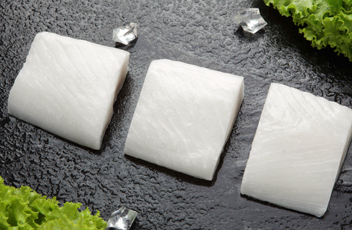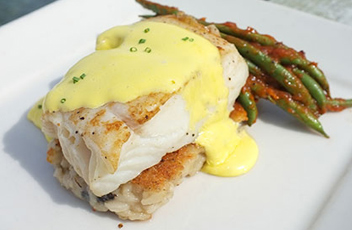Pacific Halibut
Most Pacific Halibut is caught with bottom
long-lines that
cause little habitat damage and have low
levels of incidental
catch. The Pacific Halibut fisheries of
Alaska, British Columbia
and Washington are certified as
sustainable to the standard
of the Marine Stewardship
Council (MSC).
The Russian catch currently is not certified as an MSC fishery.
Pacific
Halibut, a bottom-dwelling groundfish, is primarily
found in
the coastal North Pacific Ocean and Bering Sea.
Pacific Halibut are caught also by way of "bottom gill-net" -
employed in Russian fishing grounds. Long-line fishing
method causes little habitat damage or by-catch.
The International Pacific Halibut Commission (IPHC)
manages Pacific Halibut in Alaska. Each year, the IPHC
conducts a population assessment and reviews
indepen-
dent assessments to set annual catch limits.
These limits
are allocated among licensed fishing vessels,
giving each
boat a prescribed percentage of the total. This
process has
resulted in longer fishing seasons, while
keeping the
population healthy and abundant.
Pacific Halibut from the U.S. are listed as a "Best Choice"
on the Monterey Bay Aquarium Guide.
Fisheries managers adopted an individual
fishing quota
(IFQ) program for the Alaska commercial
long-line fishery in
1995 (Canada implemented a similar
program in 1991).
This program allocates a set quota of
the allowed harvest
to individual fishermen, allowing them
the flexibility to
harvest their quota within a longer season.
This program extended the fishing season to
almost 9 months,
increasing the value, safety, and efficiency
of the fishery.
Consumers can now enjoy fresh halibut
nearly year-round.
This fishery is considered to be among
the best-managed
sustainable fisheries in the world.
Fletches:
6/8 oz., 8/16 oz., 1/3 lb., 3/5 lb., 5 lb./up
Portions:
"Custom cut/processed" to exact customer specifications
(inventory
held in the USA – available by contract/agreement).
Products available include; straight cuts and bias cut
"pre-cuts";
We specialize in unique hand-cut portions, as
small as ½-1 oz., 1-2 oz., 2.0-2.5 oz., and larger - perfect
fish
and chip portions, all the way to 4, 6, or 8 oz. or
more "Center of the Plate" portions.
Chang Versions Offered
Pacific Halibut can be prepared in a variety of ways.
Steamed, baked, broiled, fried in batter or breading,
roasted, en pappiote,
pan-fried, grilled (flat-top or char-
grilled), stir-fried, or sauteed. Halibut is very
versatile
and is simply a delicious firm white meat.
Nutritional Information — Pacific Halibut:
- Serving Size (140 g)
- Calories 110
- Calories from Fat 18
- Total Fat 2.0g 3%
- Saturated Fat 0.4g 2%
- Cholesterol 70mg 23%
- Sodium 95mg 4%
- Protein 24.0g
- Iron 0.35 mg
- Energy 70 kcal
- Total lipid (fat) 0.3g
- Fatty acids, saturated 0.4 g
- Fatty acids, monounsaturated 1 g
- Fatty acids, polyunsaturated 0.5 g









